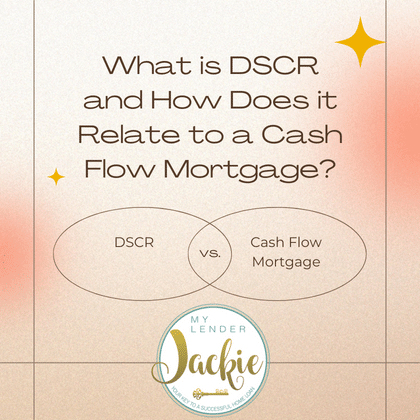
Instead of your income, we look to other metrics to qualify you for a cash flow mortgage, including your credit score and the DSCR. If you’re not familiar with DSCR, don’t worry, we’ve got your questions answered below.
What is DSCR?
DSCR stands for “Debt Service Coverage Ratio,” and it is a crucial metric used in the world of cash flow mortgages, particularly in commercial real estate and investment property financing. DSCR is used by lenders to assess the financial health and risk associated with a property’s ability to generate enough income to cover its debt obligations.
In simple terms, DSCR measures the property’s ability to generate sufficient cash flow to cover its mortgage payments, including principal and interest, as well as other related expenses such as property taxes, insurance, and property management fees. A higher DSCR indicates a property’s stronger ability to meet its debt obligations, and that means lower risk for lenders that translates into better terms for borrowers.
How is DSCR calculated?
The formula for calculating DSCR is: DSCR = Net Operating Income (NOI) / Total Debt Service. In other words, the property’s total income generated from rents and other sources, minus operating expenses (excluding debt payments) is divided by all the property’s debt-related payments, such as principal and interest on the mortgage.
A DSCR of 1 indicates that the property’s cash flow exactly covers its debt payments, while a DSCR less than 1 suggests that the property’s income is insufficient to meet its debt obligations.
Fro example, a property that generates $200,000 in annual income, but has $50,000 in annual operating costs, the NOI would be $150,000. Let’s say the Total Debt Service (mortgage payments) for that property is $120,000 for the year. Plugging the numbers into our formula, we would see that the DSCR for that property would be 1.25, meaning the the property’s cash flow covers its debt obligations 1.25 times over.
Why does DSCR matter for a cash flow mortgage?
The DSCR is the formula we can easily employ to determine the profitability of the investment. An appraisal of the property and a look at comparable rentals in the area will give you an idea of your expected income from the property, but the DSCR calculation takes this a step further.
In addition to being a useful tool for lenders to determine whether to extend a loan, using the DSCR formula is a great idea for you as a lender. Making sure that you have a DSCR of 1 or higher will ensure that you are at least breaking even, but hopefully generating positive income each month with your investment.
While owning real estate in general is a wise investment because of long term appreciation, most investors are also looking to generate profit immediately. This metric will help you determine if that is a realistic goal with your potential investment.
We have worked with many real estate investors to help them reach their real estate goals with cash flow mortgages, and we would love to help you, too. Contact us any time to learn more.

